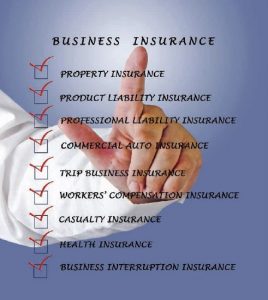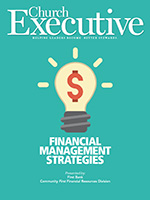
By Therese DeGroot
The loan underwriting process is centered on determining the level of risk associated with each ministry. As a part of that risk management process, we inquire about the amount of debt, cash reserves, as well as the limits and type of insurance coverage the ministry maintains.
Responses generally include the current loan amount, existing cash on hand, and the policy limits of property and liability insurance coverage. While most ministries understand the importance and value of adequately insuring their physical property and assets against potential loss, many don’t think about insuring their most important assets: the key people responsible for executing the vision of the ministry.
With the important task of “Building the Kingdom,” insurance is critical. It not only protects the ministry and key staff but can also be an important benefit in recruiting and retaining key staff so they feel financially secure and can direct all their energy towards the ministry.
Insurance is critical in safeguarding the ministry and solidifying the budgets and financial plans of both the ministry and staff. Therefore, an annual, comprehensive review and evaluation of Life, Disability and Long-Term Care Insurance needs and offerings is a best practice, along with determining cost-effective solutions for the ministry and staff.
 An insurance review will determine if the ministry:
An insurance review will determine if the ministry:
- Has the proper amount of Property, Liability, Life, Disability and Long-Term Care coverage
- Has the type of insurance that best fits the church’s needs
- Has adequate liquidity and cash reserves to fund potential losses
- Is paying a cost-effective price
- Has the appropriate beneficiaries and assignments.
Life insurance
The discussion around life insurance should also include succession planning. While life insurance provides immediate liquidity upon death, there should also be a formal succession plan in place. Ministry lenders — and most ministry boards — know how important both are when a senior pastor or key employee passes, and require it as a condition of a loan. Knowing the financial obligations of the church are met allows the ministry to feel safe and secure while implementing a sound succession plan and / or searching for a new senior pastor or key person. When properly structured, this death benefit makes the unexpected and significant transition smoother by funding a possible reduction in tithes and offerings, assisting the family in meeting important financial goals and guarantees that the ministry continues as planned, even when faced with the untimely death of a pastor or key employee.
Disability insurance

A disability can be more financially disastrous than a death. The ability to earn a living is one of the most significant assets there is. A pastor or other key person unable to continue to earn income due to an illness or injury could be financially devastating for the person, as well as a setback to a ministry.
Disability insurance benefits can be used to preserve independence, provide time to recover and / or retrain for a new job while conserving assets. If pastors or key leaders do not have Disability insurance, many ministries choose to continue to pay them for some period of time in an effort to respect the contributions this person has made which can place a financial burden on the ministry. Consider offering this important insurance benefit to key leadership as part of a compensation package which will ensure both the ministry and family are provided for.
Long-term care insurance
Another important insurance benefit the ministry can offer to key leadership, and might or might not choose to provide as part of its compensation package, is Long-term care insurance. An aging populace and medical care inflation are key in determining if personal assets are sufficient to pay for in-home care, an assisted living facility or a nursing home. Long-term care insurance is an affordable solution to personalize your choice of care options, protect your assets and preserve your freedom and dignity.
The primary value of insurance is that it is a cost-effective way to shift or mitigate the often overwhelming cost of risk. Insurance offers several advantages not available from any other financial instrument. It provides peace of mind and an infusion of cash for dealing with the adverse financial consequences of events that could significantly impact a person and or a ministry. It is critical for leadership to review coverage annually during the planning and budgeting season to ensure this important risk management tool is appropriately used.
Therese DeGroot has developed and managed religious lending programs for 25 years for many banks that now specialize in lending to churches, nonprofits and schools. She is Managing Director of First Bank’s Community First Financial Resources Division in Lake Forest, CA.


